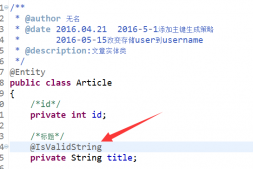雙向鏈表是一個基本的數據結構,在Java中LinkedList已經實現了這種結構,不過作為開發者,也要擁有自己顯示這種結構的能力。話不多說,上代碼:
首先是鏈表的節點類:
|
1
2
3
4
5
6
7
8
9
10
11
12
13
14
15
16
17
18
19
20
21
22
23
24
25
26
27
28
29
30
31
32
33
34
35
36
37
38
39
40
41
42
43
44
45
46
47
48
49
50
51
|
/** * 鏈表節點 * @author Administrator * * @param <T> */public class ChainNode<T> { private T data; //對象編號 private int dataNo; public ChainNode<T> nextChainNode; public ChainNode<T> preChainNode; public ChainNode(T data, ChainNode<T> nextChainNode, ChainNode<T> preChainNode) { this.data = data; this.nextChainNode = nextChainNode; this.preChainNode = preChainNode; } public ChainNode(T data) { this.data = data; } public int getDataNo() { return dataNo; } public void setDataNo(int dataNo) { this.dataNo = dataNo; } public void setData(T data) { this.data = data; } public T getData() { return data; } } |
然后是鏈表:
|
1
2
3
4
5
6
7
8
9
10
11
12
13
14
15
16
17
18
19
20
21
22
23
24
25
26
27
28
29
30
31
32
33
34
35
36
37
38
39
40
41
42
43
44
45
46
47
48
49
50
51
52
53
54
55
56
57
58
59
60
61
62
63
64
65
66
67
68
69
70
71
72
73
74
75
76
77
78
79
80
81
82
83
84
85
86
87
88
89
90
91
92
93
94
95
96
97
98
99
|
<pre name="code" class="java">/** * 鏈表實現類 * @author Administrator * * @param <T> */public class Chain<T> { //頭節點 private ChainNode<T> headNode; //末尾節點指針 private ChainNode<T> lastNode; private int size; //創建鏈表就創建頭節點 public Chain() { this.headNode = new ChainNode<T>(null); this.lastNode = headNode; } //增加一個節點 public void addNode(T data) { ChainNode<T> node = new ChainNode<T>(data); if(lastNode != null){ lastNode.nextChainNode = node; node.preChainNode = node; node.setDataNo(size); lastNode = node; size++; } } //刪除指定索引的節點 public void deleteNode(int dataNo) throws Exception { if(getSize() == 0){ throw new Exception("chain is empty"); } for (ChainNode<T> node = headNode.nextChainNode;node != null;node = node.nextChainNode) { if(node.getDataNo() == dataNo){ node.preChainNode.nextChainNode = node.nextChainNode; if(node.nextChainNode != null){ node.nextChainNode.preChainNode = node.preChainNode; } node.nextChainNode = null; node.preChainNode = null; size--; //重新設置節點的編號 for (ChainNode<T> chainNode = node.nextChainNode;chainNode != null;chainNode = chainNode.nextChainNode) { chainNode.setDataNo(chainNode.getDataNo()-1); } return; } } throw new Exception("the corresponding data that can not be found"); } //獲取指定索引的節點 public T get(int dataNo) throws Exception { if(getSize() == 0){ throw new Exception("chain is empty"); } for (ChainNode<T> node = headNode.nextChainNode;node != null;node = node.nextChainNode) { if(node.getDataNo() == dataNo){ return node.getData(); } } throw new Exception("the corresponding data that can not be found"); } //修改對應索引的節點 public void set(int dataNo,T data) throws Exception { if(getSize() == 0){ throw new Exception("chain is empty"); } for (ChainNode<T> node = headNode.nextChainNode;node != null;node = node.nextChainNode) { if(node.getDataNo() == dataNo){ node.setData(data); return; } } throw new Exception("the data that is to be modified can not be found"); } //是否包含對應數據的節點 public boolean isContains(T data) throws Exception { if(getSize() == 0){ throw new Exception("chain is empty"); } for (ChainNode<T> chainNode = headNode.nextChainNode;chainNode != null;chainNode = chainNode.nextChainNode) { if(chainNode.getData() == data){ return true; } } return false; } //獲取節點數量(不含頭節點) public int getSize() { return size; } } |
測試一下:
|
1
2
3
4
5
6
7
8
9
10
11
12
13
14
15
16
17
18
19
20
21
22
23
24
25
26
27
28
29
30
31
32
33
34
35
36
37
38
|
public class ChainTest { public static void main(String[] args) throws Exception{ String oneString = "one"; String twoString = "two"; String threeString = "three"; String fourString = "four"; Chain<String> chain = new Chain<String>(); chain.addNode(oneString); chain.addNode(twoString); chain.addNode(threeString); chain.addNode(fourString); for (int i = 0; i < chain.getSize(); i++) { String string2 = chain.get(i); System.out.println(string2); } try { String string = chain.get(2); System.out.println("the data of the second node is"+string); System.out.println(chain.isContains(fourString)); chain.set(1, "haha"); System.out.println("modify chain"); for (int i = 0; i < chain.getSize(); i++) { String string2 = chain.get(i); System.out.println(string2); } chain.deleteNode(3); System.out.println("delete one node"); for (int i = 0; i < chain.getSize(); i++) { String string2 = chain.get(i); System.out.println(string2); } } catch (Exception e) { // TODO Auto-generated catch block e.printStackTrace(); } } } |
結果:
|
1
2
3
4
5
6
7
8
9
10
11
12
13
14
15
|
onetwothreefourthe data of the second node isthreetruemodify chainonehahathreefourdelete one nodeonehahathree |
感謝閱讀,希望能幫助到大家,謝謝大家對本站的支持!
原文鏈接:http://blog.csdn.net/sinat_23092639/article/details/51160621















